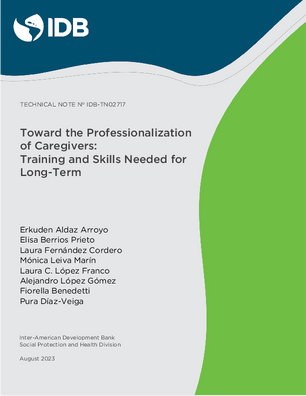Toward the Professionalization of Caregivers: Training and Skills Needed for Long-Term Care
Date
Aug 2023
The accelerated process of population aging in Latin America and the Caribbean is leading to an increase in the number of older persons and, in particular, of those who are in a situation of functional dependence and need care. To ensure this is high quality care, one of the challenges the countries of the region face is the training of caregivers.
In a survey of caregivers in Colombia, Costa Rica and Uruguay, we found that the level of training of most caregivers is low or nonexistent. There are gaps in technical skills (e.g., how to support changes in posture), relational skills (e.g., how to tackle depression or communicate with persons with dementia) and self-care skills. We also found significant gaps in the number of trained caregivers by country.
Likewise, with the aim of promoting training and professionalization of the care sector, one of the added values of this study is that we analyze and compare, for the first time, training policies, curricula, approaches, contents and methodologies in Latin America and the Caribbean, and internationally. In this research, which arises from a technical cooperation executed by the Astur Foundation, we have particularly studied the cases of Colombia, Costa Rica, Uruguay, Spain, Finland, France and Italy. One of the main findings is that training programs in the region are in transition from a service-based model to a person-centered model.
In addition, another added value of this study is that, based on the lessons learned from good practices in Latin America and the Caribbean and internationally, and on the skills gaps identified in caregivers, we propose four training courses. The novelty of this training is that they mainstream the Person-Centered Care approach and propose a theoretical, practical and experiential methodology. Moreover, the competencies to be developed, the contents and the course load of each training are included. These four training courses are aimed at: 1) those who are already working in the care field, 2) those without any previous experience, 3) those who wish to specialize in care in high-dependence situations and 4) care service coordinators and decision makers.
In a survey of caregivers in Colombia, Costa Rica and Uruguay, we found that the level of training of most caregivers is low or nonexistent. There are gaps in technical skills (e.g., how to support changes in posture), relational skills (e.g., how to tackle depression or communicate with persons with dementia) and self-care skills. We also found significant gaps in the number of trained caregivers by country.
Likewise, with the aim of promoting training and professionalization of the care sector, one of the added values of this study is that we analyze and compare, for the first time, training policies, curricula, approaches, contents and methodologies in Latin America and the Caribbean, and internationally. In this research, which arises from a technical cooperation executed by the Astur Foundation, we have particularly studied the cases of Colombia, Costa Rica, Uruguay, Spain, Finland, France and Italy. One of the main findings is that training programs in the region are in transition from a service-based model to a person-centered model.
In addition, another added value of this study is that, based on the lessons learned from good practices in Latin America and the Caribbean and internationally, and on the skills gaps identified in caregivers, we propose four training courses. The novelty of this training is that they mainstream the Person-Centered Care approach and propose a theoretical, practical and experiential methodology. Moreover, the competencies to be developed, the contents and the course load of each training are included. These four training courses are aimed at: 1) those who are already working in the care field, 2) those without any previous experience, 3) those who wish to specialize in care in high-dependence situations and 4) care service coordinators and decision makers.




